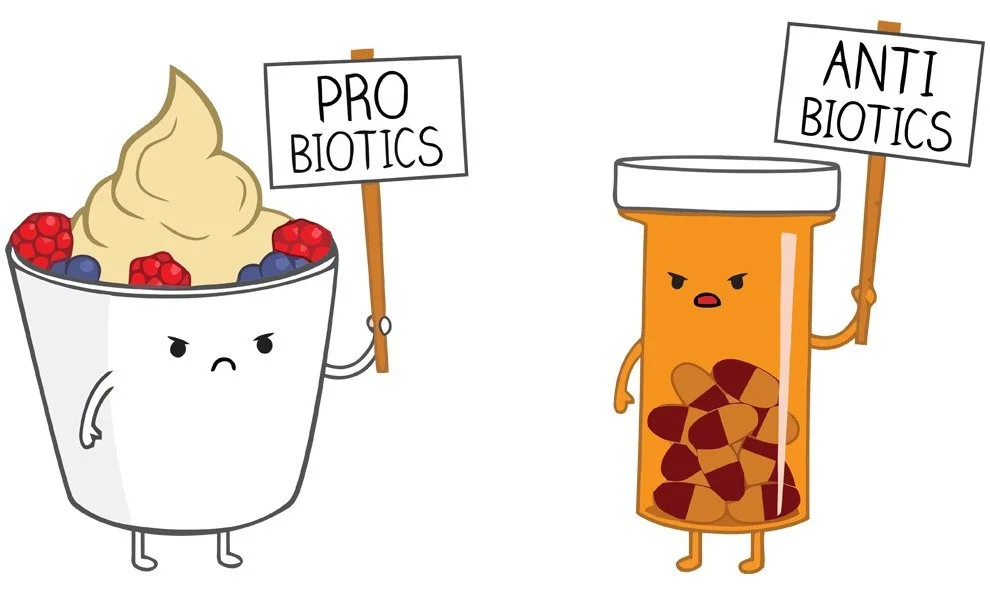- PoopMates
- Posts
- 💩 Probiotics and Prebiotics: What’s the Difference for Gut Health? 🤔
💩 Probiotics and Prebiotics: What’s the Difference for Gut Health? 🤔
Pro vs Prebiotics: Their Roles and Benefits

GM! This is PoopMates HQ bringing you another edition of the PoopMates newsletter. Today we’re diving into a subject that many are familiar with but may still be a bit confused about: Probiotics vs Prebiotics.

PROBIOTICS AND PREBIOTICS: A GUT REACTION 🧪

What’s the Difference for Gut Health? 🤔
When it comes to gut health, understanding the difference between probiotics and prebiotics is essential. These terms are often used interchangeably, but they serve unique and complementary roles in maintaining a healthy digestive system. In this post, we’ll explore what probiotics and prebiotics are, how they work together, and the impact of antibiotics on your gut microbiome. (tl;dr at the bottom)
What Are PRObiotics?
Probiotics are live bacteria and yeasts that provide numerous benefits for your gut health. These "good" bacteria help maintain balance in your gut microbiome, which is crucial for proper digestion, immune function, and overall well-being. Sources of probiotic rich food include:
Fermented Foods: Yogurt, kefir, sauerkraut, kimchi, and kombucha.
🔎 Research Insights: Multiple studies found that regular consumption of probiotics improved gastrointestinal health and reduced symptoms of irritable bowel syndrome (IBS) in subjects, leading to better overall digestive function.
What Are PREbiotics?
Prebiotics are types of fiber that the human body cannot digest. Instead, they serve as food for probiotics, helping these beneficial bacteria thrive and multiply in the gut. By feeding the good bacteria, prebiotics contribute to a healthy microbiome and enhance digestive health. Sources of prebiotic rich foods include:
High-Fiber Foods: Bananas, onions, garlic, leeks, asparagus, artichokes, and whole grains.
🔎 Research Insights: Studies have shown that the regular intake of prebiotics significantly improved gut microbiota composition and led to enhanced bowel regularity in healthy adults.
How Probiotics And Prebiotics Work Together 🤝
It’s simple, really. Probiotics introduce beneficial bacteria into your digestive system, and prebiotics feed them!
The Role of Antibiotics 🚫
Antibiotics are powerful medications that fight bacterial infections, but they don’t discriminate between good and bad bacteria. Even though they can cure infections, they can also end up disrupting the balance of your gut microbiome by killing beneficial bacteria along with the harmful ones. This disruption can lead to digestive issues, such as diarrhea, bloating, and an imbalance in gut flora. So, if you've recently taken antibiotics, it can be a great idea to incorporate probiotics into your diet to help restore the balance of good bacteria.
TL;DR 🙂
Probiotics - Good bacteria - ex: fermented foods
Prebiotics - Food for bacteria - ex: fibrous foods
Antibiotics - Medication that indiscriminately kills good AND bacteria - so supplement with pro and prebiotics if you ever have to take a cycle of antibiotics.

💩 SH!TTY MEMEZ 🤣




Lastly, watch out for our mobile app hitting the iOS and Android app stores in the coming weeks! We think (and hope🤞) you’re gonna love it!
That’s all for today, folks. Try to enjoy some pro and prebiotic rich foods this week!
DISCLAIMER: The content provided in this newsletter is for informational purposes only and is not intended as a substitute for professional medical advice, diagnosis, or treatment. If you are experiencing a medical emergency, call your doctor or dial 911 immediately.